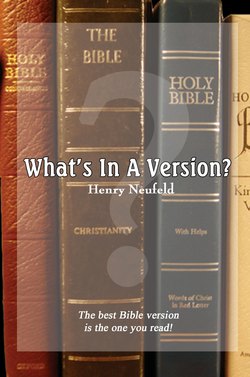Читать книгу What's in a Version? - Henry E. Neufeld - Страница 3
На сайте Литреса книга снята с продажи.
Preface
ОглавлениеWhy another book about Bible translation?
There are many books reviewing versions (Kubo & Specht, "So Many Versions") or dealing with the arguments between advocates of the King James Version and of modern versions. What I have found in discussing this issue is that many people don't understand the basics of how translations are made. They get caught up in the arguments without understanding the foundation. This book is not about arguing the merits of one translation over another. In particular it is not about arguing the merits of the King James Version of the Bible as opposed to modern versions. It is about laying a foundation.
What I intend to do in this book is present an overview of how translations are produced, what makes them different from one another and how a reader who doesn't know the source languages (Hebrew, Aramaic and Greek) can choose a version or versions of the Bible for use. Since many people don't know how the Bible came into existence, how its text has been preserved, and how translation is accomplished, they are subject to misinformation. The differences between the various versions can be frightening when they are not understood. How can there be so many differences unless someone is being careless, or even worse, someone is intentionally altering God’s word?
I have kept this book short intentionally and interspersed it with many illustrations. It is not intended for a scholarly audience, but rather for the layperson who wants some practical information. The Bibliography contains a list of works for those who want to explore the subject of translations more extensively.
I have been helped by many people in preparing to write this book. First, I want to thank my uncle, Don F. Neufeld, who introduced me to the study of both Greek and of Hebrew, and to those professors of Greek and Hebrew who helped me along the way. I want especially to thank Dr. Alden Thompson of Walla Walla College who helped me to better understand a God who could work providentially in many different ways, and not just in those ways I expected Him to.
A number of classes and study groups have suffered through this material and tolerated my enthusiasm for minor details of translation theory, as have many people with whom I have discussed, both in person and via electronic mail. I enjoyed (and still enjoy) talking with you all.
Most of all I want to thank those people who, under the guidance of God, worked to preserve the treasure of the Bible in times when it was not nearly so easy as now. Many of them lost their lives in that work. They spent years for what takes us only days or weeks, yet they persevered. It is to them we owe the greatest thanks.
